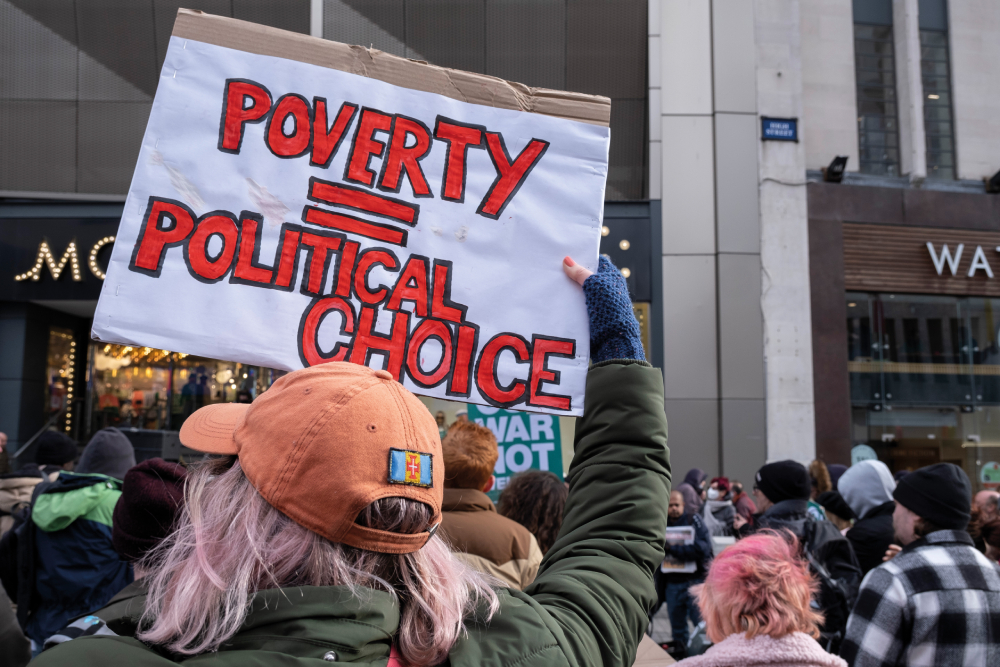
Introduction
Amnesty International UK is embarking on a renewed focus on Economic, Social, and Cultural Rights (ESCR), amplifying our dedication to promoting human rights in the UK and worldwide. Traditionally, we have prioritized civil and political rights (such as right to a fair trial, to life, to peaceful assembly, to free expression, etc.), but ESCR or our "everyday rights" are fundamental to all our daily lives. Where would you be without access to water, food, healthcare, and housing?
We recognise the importance of ESCR and so have integrated these rights into our plans for the next 10 years, underscoring their significance in advancing human rights globally.
Understanding Economic, Social, and Cultural Rights (ESCR)
Economic, social, and cultural rights (ESCR) constitute a diverse spectrum of fundamental human rights essential for individuals' well-being and dignity. ESCR are about the rights we need to live our lives on a daily basis, the food we eat, the homes we live in, the education we can offer to our kids. But when the state fails to protect these rights, we cannot fight to defend them in court. The government has committed to uphold our ESC rights, through international treaties but not made it possible to claim these rights in a UK court.
These rights encompass a range of issues that affect us all, including but not limited to:
- Right to Adequate Standard of Living: Ensuring an adequate standard of living is integral to ESCR, encompassing access to adequate housing, food, clothing, and other essentials for a dignified life. Amnesty International UK's community consultations revealed alarming trends of people on benefits or in low paid work not being able to feed themselves or their families due to benefits not keeping up with living costs and rising prices leading to a reliance on food banks and inadequate access to other basic necessities.
- Right to Housing: Many individuals and families across the UK do not have access to safe, secure, and affordable housing. Amnesty International UK's 2022 Report on Homelessness In England shed light on the dire realities of housing insecurity, emphasizing the discrepancy between this right and its implementation in policy and practice.
- Right to Social Security: Social security, or what most people call welfare or benefits, is meant to ensure individuals' and families do not fall into poverty. However, the current social security system in the UK faces criticism for its punitive nature, particularly the benefits sanctions regime. Our community consultations have revealed widespread concerns about how these measures exacerbate poverty and deny access to basic necessities for those who fail to comply with benefit conditions. We have been around the country consulting with the communities most affected by the failures in the social security system in the UK. We have heard widespread concerns about the ways benefits are managed and the sanctions that people face. This is leading to people being unable to afford basic necessities.
- Right to Health: Equitable access to health care and treatment is crucial for individuals' physical and mental well-being. In the UK, some people face inequality in access to services which mean they die earlier than other because they come from a less wealthy background, have been homeless or because they have a protected characteristic. Our focus on the right to health extends to areas such as access to mental health support, legalisation of abortion, the handling of the Covid-19 pandemic and much more. Our community consultations show the range of issues people in poverty face to accessing health whether that is getting a doctor's appointment if you do not have a fixed address to accessing mental health services, including for people at serious risk of self-harm.
- Right to Education: Education is essential for personal development to have the educational outcomes they need to access good work and income., AIUK have widespread concerns about the lack of educational opportunities and support for individuals with special educational needs and those who come from lower socio-economic groups. The failure of systems to address and accommodate diverse educational needs perpetuates inequalities and denies individuals their right to education.
- Right to Work: The right to work encompasses not only the freedom to engage in employment but also fair and equitable working conditions. Amnesty International UK's work on the gig economy highlighted instances where individuals, including those working at prominent companies like Meta (Facebook) faced rights violations such as denial of fair wages and unsafe working conditions.
These individual rights encapsulate the broader framework of ESCR, emphasizing the multifaceted nature of rights violations and the urgent need for targeted advocacy and policy reform to address systemic inequalities and ensure the realization of these fundamental rights for all individuals across the UK.
However, unlike civil and political rights, which are protected under the Human Rights Act in the UK, ESCR lack the same legal recognition and enforcement mechanisms, presenting obstacles in addressing rights violations. Despite governmental commitments to uphold ESCR through treaties like the ICESCR, translating these rights into enforceable laws remains a challenge.
Amnesty International's Focus on ESCR
We are renewing our focus on ESCR in 2024.Through extensive community consultations across the UK, we spent lots of 2023 gathering valuable insights into the realities of ESCR violations experienced by marginalized communities. These consultations revealed widespread concerns, particularly in areas such as education, work, Social Security, adequate standard of living, and health. We will be developing this work in 2024 so watch this space!